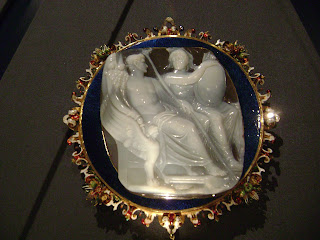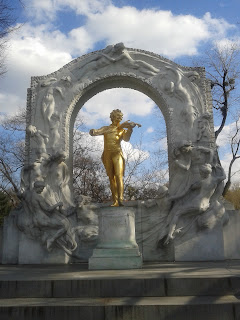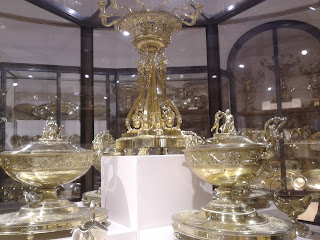The idea of visiting Vienna during my current vacation was brewing in my head for some time now.
Since I treated myself with nice visits to Budapest and Berlin not long ago, there is no reason why I shouldn't do it again and see for example third famous city in central Europe that once was a seat of the great empire.They say that my own Zagreb was always Vienna's little cousin and indeed we are greatly influenced by Austrian food, architecture and even occasional German expression. So I found myself B&B and was very excited and happy to arrive in Vienna and do some serious cultural pilgrimage. My happiness was immediately erased as I got in some accident with local underground attendants - my week ticket appears to have been misprinted by machine (it turns out ticket was for the next week, not starting from the day of my arrival) and although it was clear that I am a freshly arrived tourist who properly bought ticket, the guy gloated as he charged me the full fine of 100 euros for not having a ticket so this kind of spoiled my whole arrival and I had to work hard on leaving it behind and convincing myself it doesn't matter, but it did matter. I wondered why did I even came here instead of staying comfortable where I was.
Vienna is huge version of my own Zagreb, much bigger and more glamorous but basically very much the same thing on larger scale.
To my biggest surprise it turns out there is a enormous amount of people from Balkans who moved here - Serbians, Croatians, Romanians, Bulgarians, you name it - along with Turks and such. I heard my own language on the streets much more than even German! In a way it was fine for me as I could easily ask for directions, for example, but I didn't exactly had feeling of being in a foreign place.
Very first place I visited was famous Kunsthistorisches Museum (Museum of Art History) which was magnificent palace right in the centre. It is truly a cornucopia of art and you can spend the whole day there - I was thrilled as I explored ancient Egyptian mummies, sculptures from Greece and Rome, some truly exceptional Roman cameos and treasures found from the times of great migrations, some of them are still complete mystery to archaeologists. The paintings collection is wonderful, it might be even one of the best I have seen so far - Rafael, Tizian, Canaletto, Caravaggio, Hieronymus Bosch, the whole rooms focused on Pieter Bruegel and Rubens, I even found my dear friend, deaf and mute landscape painter Hendrick Avercamp to whom I blew a delighted kiss. Both Albrecht Dürer and Hans Holbein were also included, along with famous works by Velázquez (the whole room with his portraits of Spanish royal children). There is also another part of exhibition, called Kunstkammer and it has breathtaking art in gold, stone, wood, ivory and such - mostly decorative art, some of it dating from middle ages. When I left the place my head was buzzing with excitement.






Schönbrunn Palace was also delightful peek in the famous history - it has truly stunning surrounding parks and I walked all the way behind it to famous Gloriette (where I treated myself with a nice coffee) than back to the palace itself. Once it was place where Emperor lived, surrounded by countless officials and ordinary mortals could visit only if they asked for favours , nowadays everybody can see the carefully restored rooms and gawk at emperor's WC. All these salons had various functions and though it seems luxurious, I was aware that royal family was actually hardly ever alone there and they always had people around them, so it must have been crowded. I have seen the salon where little Mozart played for Empress Maria Theresia and even private rooms of famous Empress Sissy who is now a focus of the whole tourist industry with countless souvenirs about her.



Naturhistorisches Museum Wien (Vienna Museum of Natural History) was awesome - its all about life on Earth and it starts with carefully selected collection of every single crystal and mineral on our planet, than it goes to meteorites that probably brought life to this planet, fossils, reconstructed mammals, dinosaurs, mammoths and finally first human-like creatures of the world. From there it goes on to show the artifacts from stone age, bronze age and such - my biggest thrill was to see with my own eyes the figurine Venus of Willendorf - contrary to what I expected, she was not some fat monster (even the name given to her is pejorative) but a cutest little figure that could easily fit in child's palm and she is extremely lovable and very, very carefully carved in stone. We know absolutely nothing about the artist, her purpose, was she a totem or a decoration - what I can easily tell is that someone created her with lot of care and love 29 500 years ago and its just amazing how we feel her loveliness trough this enormous amount of time, its impossible even to contemplate the thousands of years between us.




Academy of Fine Arts Vienna was to be honest, a disappointment - it is a huge palace that serves as educational institution and it advertises exhibition but in fact this exhibition turned out to be just a half of one floor so basically you just started walking and realise that's it. It is one corridor carefully designed as two, so you finish one corridor, turn back to the exit and in 10-15 minutes the whole exhibition is done. There are some nice pieces of art, notably spectacular, apocalyptic Last Judgement Triptych by Hieronymus Bosch (it was this poster that attracted me in the first place) but I left this place a bit confused, thinking is there all there is?

Mozarthaus Vienna was a thrill - I actually got the same shivering & teared up like Stendhal in Italy, it was really moving to be in the same place where Mozart used to live - naturally this has all happened centuries ago but never mind. The house itself is a very nice townhouse right in the centre, behind famous cathedral and Mozart lived with his young family on the first floor. The whole building is now a museum, starting from third floor downwards, exhibition presenting Vienna of his time, his contemporaries, friends, visitors and career. The opera "Marriage of Figaro" was composed in this house! You look trough the window, knowing this is the same window that Mozart used to look trough on the street outside. I was very happy to be there and full of impressions afterwards, the whole day was just wonderful with a walk in the park nearby and a visit to sculpture of Johann Strauss.



Hofburg Palace was interesting experience - this was the main royal palace in town (it turns out Schönbrunn was only a summer vacation place), spectacular building(s) and of curse all the tourists were there, in fact it was so busy and crowded that I found it almost unpleasant. The entrance was already crowded and each step of the way I had to wait for people to move further. The exhibition was divided in three parts: royal exhibition of kitchen silver/gold/porcelain (very large and impressive), exhibition about Empress Sissy (who was local princess Diana for Austrians) and a tour trough royal apartments. I gawked at royal porcelain sets and just at the entrance to Sissy place realised my ticket fell out of the pocket so retraced my steps back like Sherlock Holmes and found it on the floor - in all honesty her story probably appeals more to locals who are fascinated with melodrama ("she was unhappy" muttered housewives to each other as they enviously stared at her dressing gowns). Royal apartments were luxurious and on much grander scale than the ones I saw in Schönbrunn but as I mentioned, crowd was just too much and I felt slightly claustrophobic there, had to push my way trough and to leave before I fall down on some priceless piece of history.






Belvedere Palace is divided in two - Upper and Lower Belvedere - Upper is the one you need to see because this is where the main art collection is.
It is quite wonderful place to visit and large enough for all the visitors to roam without everybody stepping on each other feet (like in Hofburg) so I had good time wondering around and admiring the art. Although there is a lot of other things, the main attraction is Gustav Klimt and his famous "Kiss" and to my biggest surprise, nothing matches seeing the painting in real life because the piece is much larger and the vision & message is completely different when seen from visitors perspective - usually on reproductions, postcards and everywhere we see only the kissing couple, but in real life you see they are surrounded with empty universe and it is this particular moment of kiss that makes the earth under their feet blossom with the flowers. It is quite a beautiful painting. There is also a interesting exhibition of grimacing busts and several pretty panoramic paintings, medieval religious art on the ground floor. Lower palace was all about local painter Johann Peter Kraft (pretty, decorative and bland bourgeois as expected) and some cubists art that left me cold, but there were several very pretty marble halls.





































